Many gun enthusiasts and beginners prefer shooting at a gun range, believing that they are at the safest place to do so.
They don’t have other people shooting at them. They only shoot at objects, and they are well-protected at all times.
What could go wrong?
Unfortunately, there is a different kind of enemy that they are unknowingly exposed to whenever they spend time in the shooting range. It’s a big problem indoors.
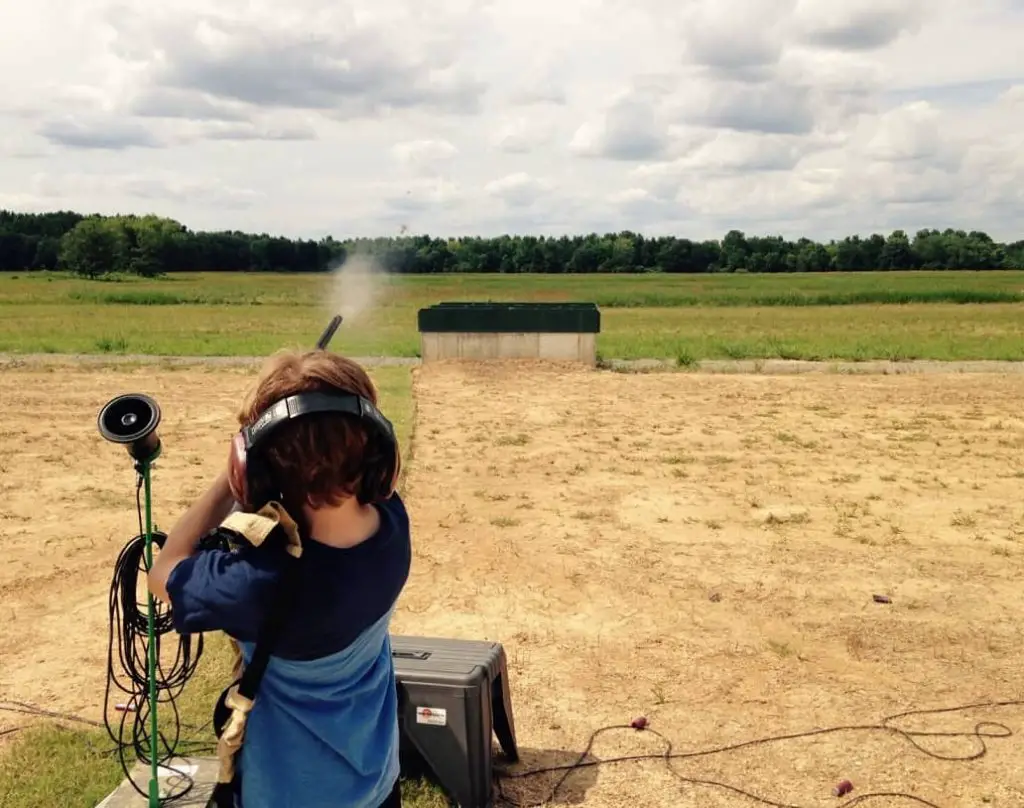
They are unaware that the dust they see when they fire a gun contains lead. And if you are not aware, it is a hazardous substance.
Exposure can cause many health complications, one of which is poisoning. And if you are curious about how this happens in a gun range, keep reading?
| Short term exposure | Long term exposure |
| High blood pressure | Damage to the brain |
| Cramps | Lower IQ |
| Headaches | Issues focusing |
| Hyperactivity |
How is Lead Released When Shooting?
Suppose you cannot imagine how the lead is released when shooting. In that case, it has to do with the gun. It’s specifically the ammunition. It is commonly found in bullets, typically used as its core.
A copper jacket surrounds the core of the bullet. Some of the lead gets released when you fire a gun.
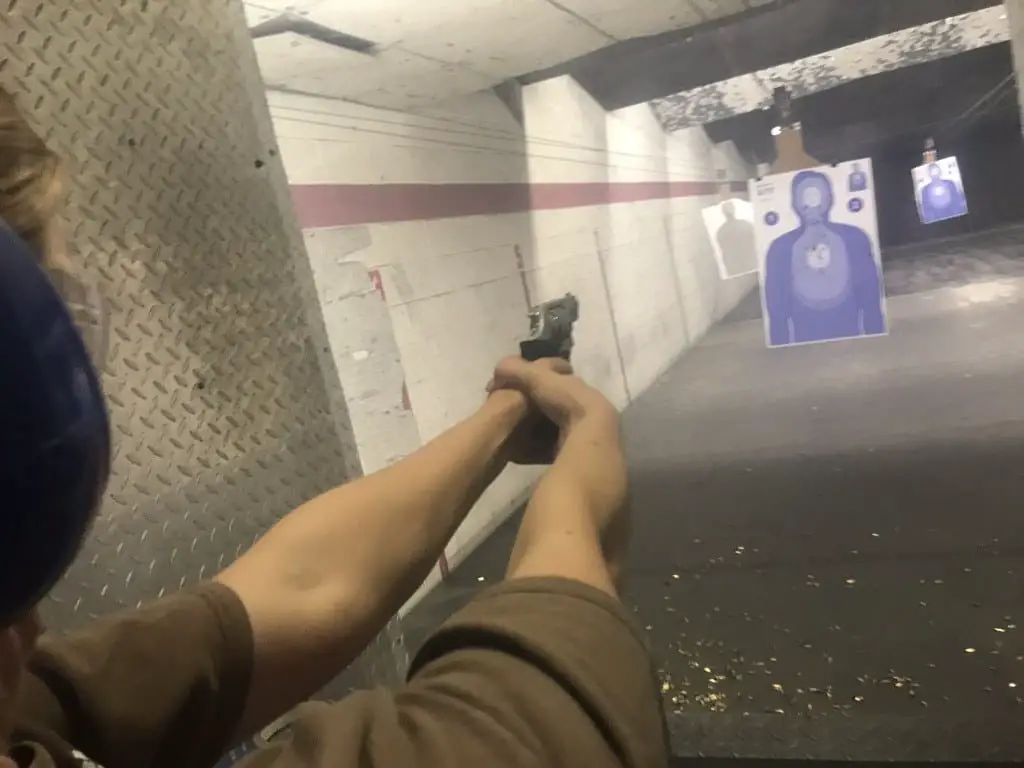
This is because shooting a gun heats up and can damage the bullet, vaporizing the inside to be released into the atmosphere.
However, most of the released lead comes from the primer used to ignite the gunpowder.
Because it used in the primer is loose, it gets released into the air in larger amounts whenever you fire a gun. It’s unlike in a bullet where it is encased.
Most people think that the smoke that comes out after pulling the trigger is just pure gunpowder. In reality, this smoke also contains these particles from both the primer and the bullet.
This smoke may come out from the muzzle. Studies have shown that lead is released on both ends of the barrel. It is blown back to the shooter when the gun is fired.
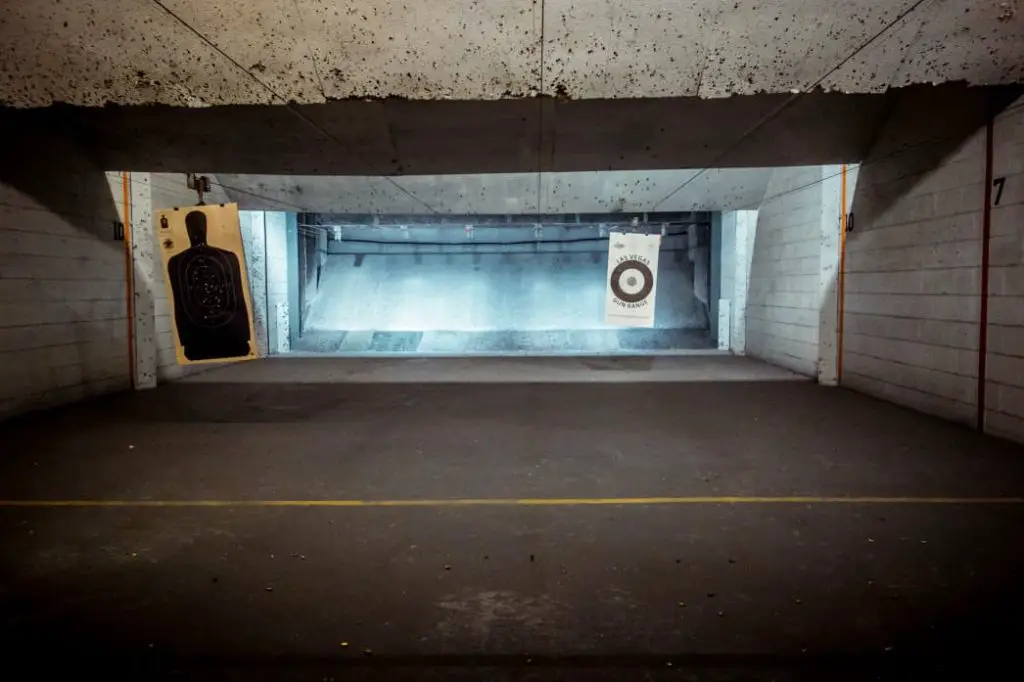
Who gets Exposed to Lead in Shooting Ranges?
You might think that only those who fire guns in the shooting ranges are exposed to lead.
Unfortunately, this is not the case; everyone who enters a shooting range is at risk for exposure.
Not only that, but they may also unknowingly bring home lead because it can easily stick to their clothing.
Shooters are not the only ones who are exposed to lead. It was discovered that the employees of these shooting ranges are the most affected.
This is because lead eventually settles onto any surface after becoming airborne and can remain there for a very long time.
And because there is a lot of activity in these shooting ranges, it gets disturbed. It becomes airborne once again, making it easy to be inhaled by anyone. It can also be ingested if it settles on food.
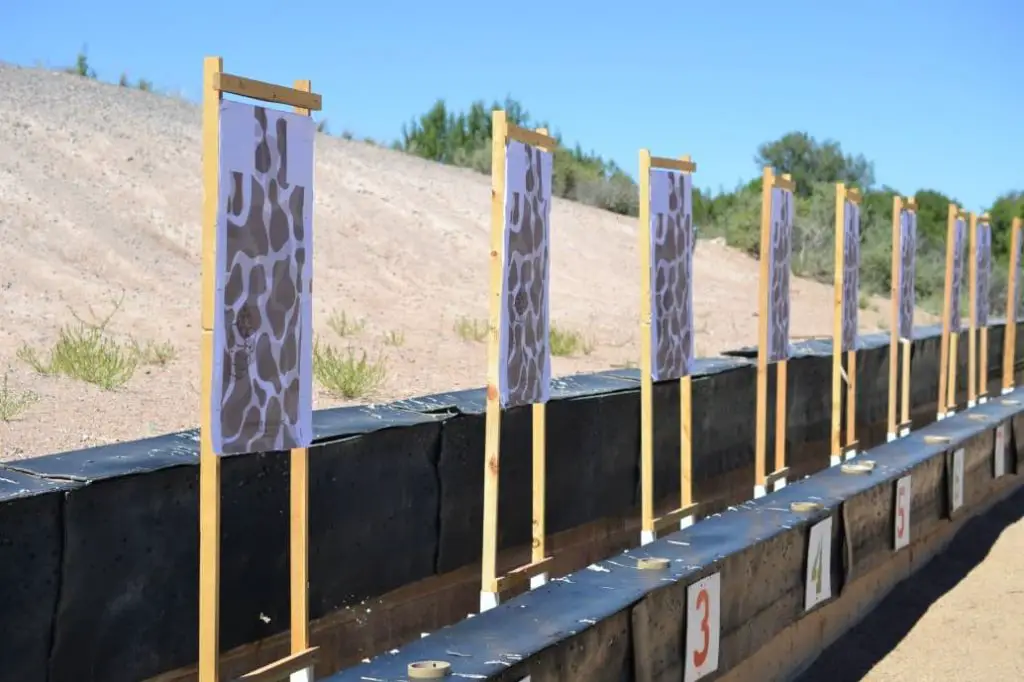
Exposure happens on both indoor and outdoor ranges, but exposure is greatest indoors. This is because the enclosed space traps lead that gets released.
And when airborne, it can circulate all over the space and eventually settle on any available space. It includes guns and safety gear.
And if the shooting range is not regularly and thoroughly cleaned, the lead will keep accumulating inside.
This is why bystanders inside the shooting range are also at risk of exposure and likely in large amounts.
In contrast, lead exposure happens in an outdoor range but in fewer amounts. Because there is better circulation outdoors, it does not get trapped in space.
Traces may be found, especially immediately after firing a gun. The open-air allows the lead to be immediately dissipated.
How Does Lead Exposure Affect Health?
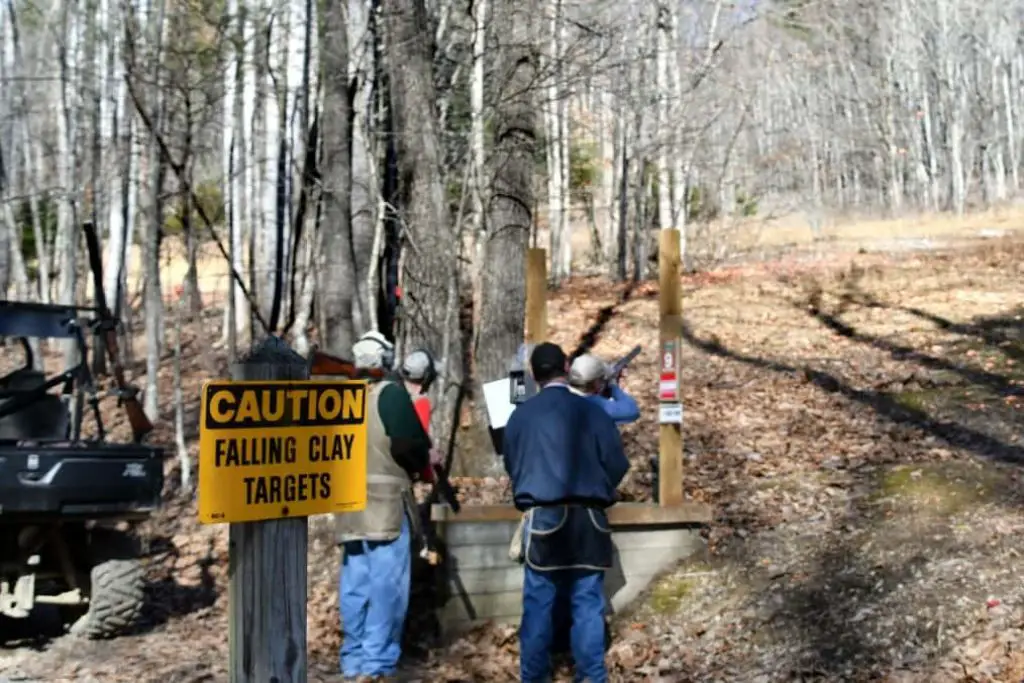
You may be thinking right now that being exposed to lead will affect your health, even in small amounts.
Unfortunately, this is somewhat true. Exposure to lead in small amounts can already cause various health issues. However, long-term exposure or exposure in large amounts will pose the greatest hazards.
Lead can be easily inhaled and ingested because of its microscopic size, which is impossible to avoid.
Its size also plays a part in negatively affecting your health. It is too small to be blocked by any of our body’s primary defenses and cannot be destroyed once inside. It can collect and remain there for months or even years.
Because of this, it can cause all sorts of health issues. It’s both in the short-term and long-term.
And if you frequent a shooting range, you must keep an eye out for signs of lead poisoning. It is becoming more common.
When this happens, it means you experienced exposure at high levels in a short amount of time.
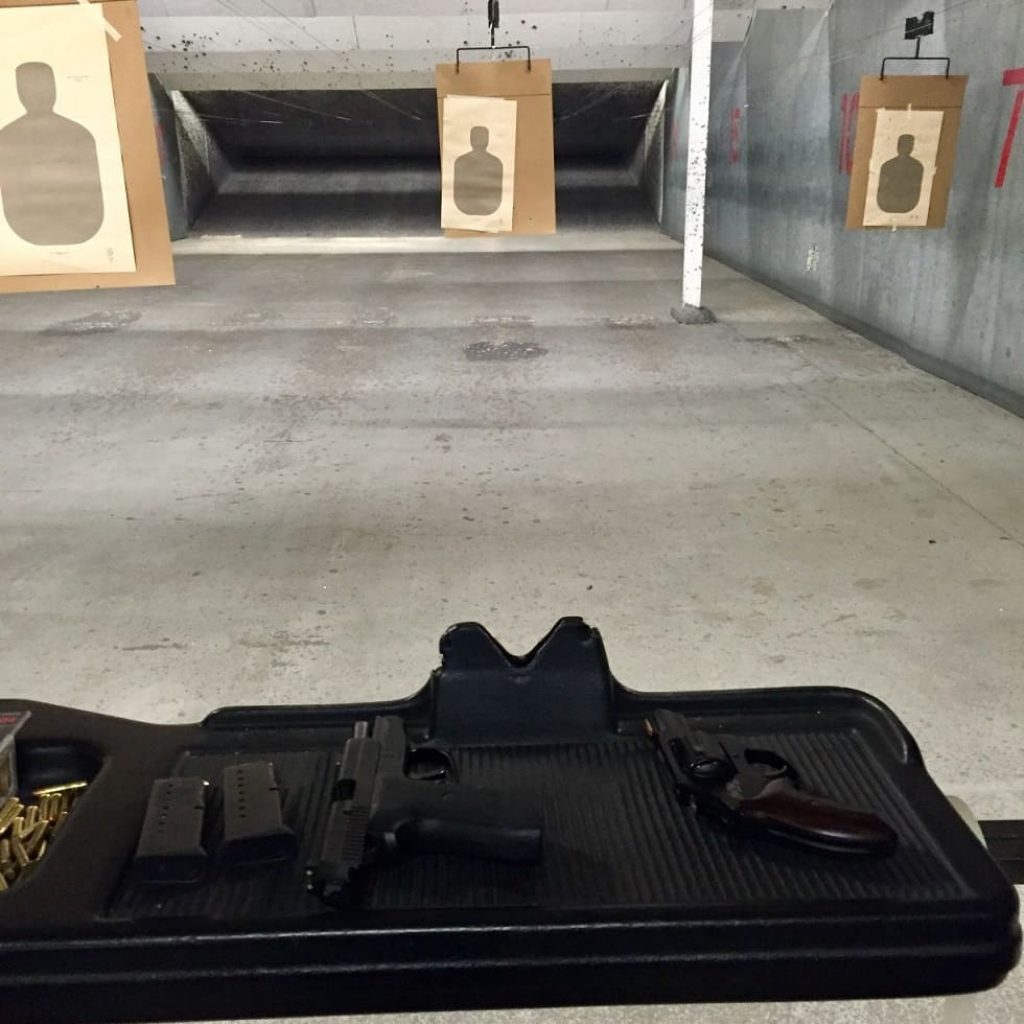
What are the Symptoms of Lead Poisoning?
Only health professionals can confirm if anyone is already experiencing lead poisoning but experiencing many symptoms. If you have been spending time in a shooting range, you may already be experiencing poisoning:
| Symptoms | |
| Anemia | Mood disorders |
| Concentration or thinking difficulties | Motor or mobility issues |
| Constipation | Nausea |
| Headaches | Pain in the abdomen |
| Hypertension | Pain in the joints and muscles |
| Insomnia | Tingling, pain, or weakness in the hands and feet |
| Irritability | Weight loss |
| Lethargy |
If you spend a lot of time in a shooting range, you should ideally see a doctor every six months. These symptoms may not be immediately manifested, and any other related health effects.
Seeing a doctor may help you detect any of these health issues caused by lead exposure before it gets worse. After all, the worst effect of poisoning is death.
How Can You Protect Yourself From Lead Exposure When in a Shooting Range?
You want to continue spending time in a shooting range but avoid the various health issues caused by lead exposure. The most important thing is to protect yourself, especially when shooting.
And because it can stick to you, you must also take measures to prevent exposing others.
There are so many ways to do that, such as:
- Use lead-free or jacketed ammunition and primer.
- Wear masks or respirators with a P100 or N100 rating and ensure that they are fitted correctly.
- Shooting in a well-ventilated range.
- Practicing good hygiene after the shooting, particularly by washing your hands with cold water and showering. Changing your clothing is important.
- Separately washing the clothes you wear when shooting to avoid contaminating your laundry.
- Avoid bringing food and drinks to the shooting range.
- If cleaning guns, wear protective equipment. It includes gloves.
- Never load a gun in a poorly-ventilated area.
There are no safe levels of lead exposure. That is why you must ensure that you are well-protected whenever you spend time at a gun range, even if you are merely a spectator.
While you may not like some of these initiatives, they are the best initiatives you can take if you are careful to limit your exposure to lead particles.
If you have young children, these are the individuals that are the most at risk when it comes to exposure.
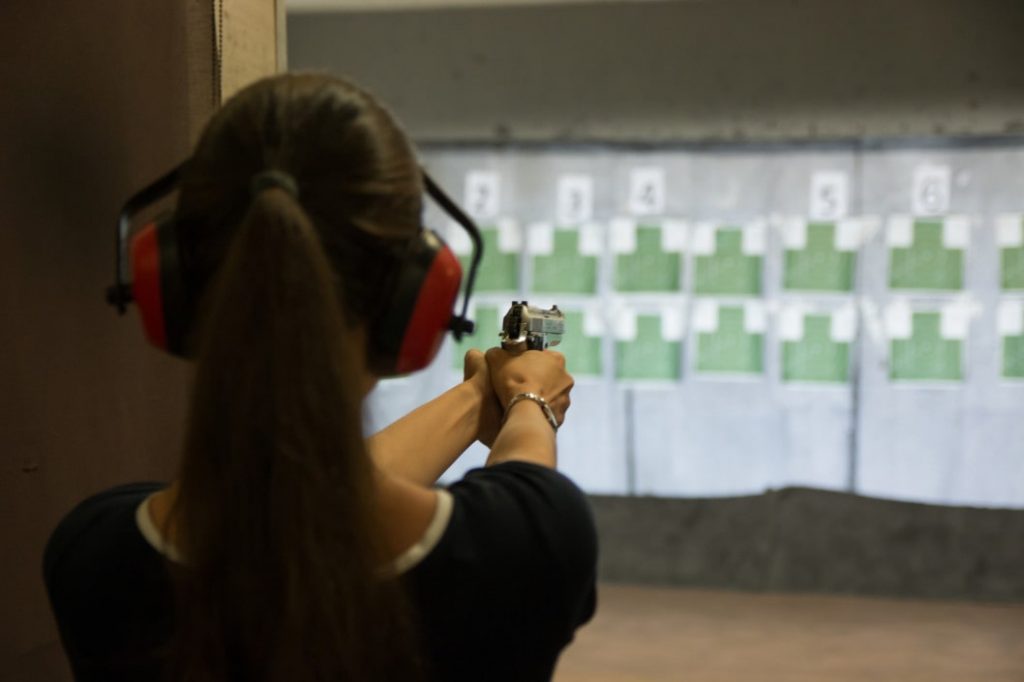
Our recommendation when it comes to teaching your kids how to shoot
Teaching your kids to shoot can be an incredible experience. It not only teaches them something that you are proud of but is arguably also a valuable skill to have.
It doesn’t change the fact that there is the potential that there may be unfortunate side effects from this activity throughout this process. Your children may end up being exposed to unfavorable lead levels in the process as well.
We do not want to take away the joy you may get from taking your kids shooting at your local shooting range. We would encourage you to consider their exposure.
How can you go about making it a safer experience for them? It’s not just in the sense that you teach them how to handle this tool better than you are teaching them how to use it. It’s also how you minimize their exposure to the harmful substance.
We have already covered some of the symptoms that you may be experiencing when exposed to higher lead levels.
We shared our belief that it would be a good idea to get your blood lead levels tested every so often. The same applies to your kids, even more so than it will to you as an adult.
Kids are still at a stage in their lives where their bodies and minds are developing. It Includes teens.
Exposure to high lead levels carries a significant risk of some of the devastating symptoms that kids will experience when exposed at a young age.
Lead exposure in kids can have devastating effects like developmental delay and cognitive decline. It’s not giving them the best chance at life they deserve.
Before you start taking your kids to the gun range, do this. Every couple of months, we recommend that you get their blood levels tested. It will ensure that they aren’t showing test results that could be a sign of an issue.
The longer the exposure is and the more distinct it is, the higher the risk of devastating side effects.
Some people may think about teaching kids how to use a gun. There is no denying that there are many instances and parts of the country where it is a very common activity to engage in.
Memberships in rifle clubs, various types of shooting sports, as well as activities that involve competing, may all expose you to lead.
Lead poisoning in children is no new occurrence. The EPA estimates that millions of homes across the United States still contain the damaging paint on the walls.
Going to shooting ranges is also doing nothing good in limiting lead poisoning in children. We encourage you to take various precautions.
We would love to dismiss the various evidence suggesting shooting ranges are an issue for kids. There have been a lot of studies since the 1970s.
These have shown that regular exposure to these places is likely to cause increased lead levels in the blood.
Teaching your kid the art of shooting should be a joyful experience. You wouldn’t want to know that such actions caused them to harm either.
Taking the initiatives mentioned earlier in the article is important. We have a couple of suggestions that we encourage you to incorporate to keep your child safe.
The employees working at the shooting ranges are going to be the ones that are the most exposed to this material. It’s especially if they work there for longer periods.
Also, they aren’t taking various precautions when cleaning the range for new shooters.
If you aren’t taking precautions, at least to the extent that it would help in diminishing their exposure. Safety measures should include wearing various types of protective gear, which most people won’t.
We would at least encourage you to make sure that you are avoiding having your kids eat and drink while they are there.
The dust will settle on their hands, which may go on the food or inside the drink. This stuff becomes an issue from the sheer proximity to the mouth.
You should also make sure that your kids don’t tend to touch their faces all the time. Their hands will contain the dangerous particles following a training session at the range.
There is a range of examples of teenagers with higher blood lead levels. It can only be explained by their activities being at these places.
One example is a case with four teenage girls who had elevated blood lead levels in Boston Children’s hospital. These four girls were all competitive shooters, doing so at indoor facilities.
This example is from 1999. Regardless of the year, there has been no significant change in the practice since then. It’s why teens engaging in the sport today are still at risk.
When you have a teenager who has shown an interest in learning the skill, we encourage you to make sure that there is a range of precautions. This includes how you choose the firing range that you use.
- The range should have good procedures for cleaning and maintaining the place. It would involve both wet cleaning and the use of a HEPA vacuum.
HEPA stands for “high-efficiency particulate air.” It is the same device used when abatement is done at a house to ensure that the small, nasty particles are removed at the end of the process.
Wet cleaning also helps remove more particles than dry cleaning does.
- The range should have a dedicated exhaust ventilation system. It will help by extracting a lot of the particles before they manage to settle on the ground or on top of other objects.
- It’s important that you teach your child not to consume beverages or snacks throughout the practice. It’s important that you make sure they understand the reason.
Whether or not your child is planning on eating or drinking after a training session, you must teach them to wash their hands. It’s important before eating and drinking.
Cold, soapy water should be used for this purpose. Use soap intended to remove dangerous particles. Cold water is better than hot water for washing as it closes the pores.
- The best option would be to wear a respirator throughout. It may not always be possible We know the difficulty in getting children and teens to wear these. A more realistic and sustainable option may rather be to use paper masks that have been rated useful for the purpose.
- Shooting should involve the use of clothing that is washed after each session at the range.
Alternatively, it can be left in a locker but must be washed regularly and should not be used as regular clothes without washing it first.
Clothes brought home from the shooting range should also be washed individually to avoid cross-contamination. Lead dust could be spread everywhere.
- It is usually good to foster responsibility among teens. It is best that they aren’t in charge of loading their own ammunition given the risk of exposure to the dangerous dust.
- For teens especially, we encourage you to consider using ammunition that does not contain any lead in them.
- Your child may be using ammunition that is free from lead. Chances are that other people aren’t, which is why these measures are still important.
When it comes to looking out for the symptoms of poisoning, it is important you play an active role. Make sure that you know the signs to look out for.
Suppose you are witnessing anything out of the ordinary. In that case, it may also be a good idea to mention that your child spends a significant amount of time at a shooting range.
The most common things for you to be looking out for in your child include difficulty thinking and unusual fatigue. It could also be a loss of appetite and decreased kidney. Liver function and increased blood pressure may happen. Constipation and stomach pain are very obvious signs to look out for, as are headaches and difficulty sleeping.
While the long-term effects of exposure are many, those are some of the more common symptoms to look out for.
If possible, you should encourage the shooting range to have a test done using an XRF machine to get a sense of the lead levels in the facility.
Other measures to take to avoid exposure
We realize you are probably reading this because you are interested in what it can do if exposed to the material at a shooting range.
The reality is that there may be other places where you are subconsciously exposing yourself to dangerous heavy metal.
We invite you to take a closer look around the blog to see if there may be other articles that are of interest to you. We would also like to point out a few on the way.
End up being more interested in what you can do. You can always see if you’d be interested in buying one of the EPA paint testing kits that we offer.
Maybe you are either pregnant or making home improvements in an old home that requires you to do things such as removing plaster from walls. Read up on the various advice we offer that could be hugely beneficial for you.
When you are doing things where lead is released into the air in dust or particles, these particles won’t just release at your convenience. Still, they will rather stick to whatever they can stick to.
Here are places where exposure often happens:
- Old buildings
- Shooting ranges
- Some water pipes
- Toys manufactured in 3rd world countries
Necessary precautions
That means that while you may take certain precautions like wearing a mask when making the home improvement, that isn’t enough.
The particles will remain in the clothes. It is why we encourage the use of disposable coveralls when you’re engaging in such activities.
These coveralls won’t just protect the normal clothing you probably don’t want to ruin with paint. Still, they’ll also contain the particles that are spread around.
When it comes to staying safe at the end of the day, it’s simply better to be able to discard what you were wearing rather than simply washing it.
Suppose it isn’t convenient or possible to use such clothing for the purpose. In that case, we emphasize that you wash it to get rid of as much of the residue as possible.
However, the first thing you should be making sure that you do when you are done with the said activity is to wash your hands thoroughly.
You may choose to use special soap intended to make sure you are adequately cleaning your hands.
Unfortunately, we cannot keep people from touching their faces. Still, at least we can help you minimize the risk that your hands contain dangerous dust particles at that point.
Are you being exposed to other sources?
The presence of lead is a lot more common than we would like to believe. It’s why you will want to make sure you are addressing all the different venues you could be exposing yourself to.
For instance, did you know that there was no law limiting the use of lead in paint before the year 1978? Yes, that’s true.
Manufacturers may have slowed down with their usage of this material at that point. The likelihood of older homes having this dangerous paint in them is higher.
Houses built up until 1978 have a fairly high chance of having lead paint in them.
When the paint deteriorates over time, the particles are released. At this point, they may be ingested by a curious mind running around finding paint chips on the floor.
They may end up in the dust flying around, at which point some are likely to be ingested.
Because of this, extensive measures have been taken throughout the years. It’s done to help address the situation and why certain things may have been required working on an old home.
In 1992, additional laws were passed that limited the usage of lead in consumer products. It capped them at 0.5% of the total amount of paint.
RRP regulations
In 2008, the EPA introduced the RRP regulations. They require you to test for lead when making any home improvement that may be disturbing the paint. It’s done to find out whether or not there’s any present.
Many things need to be done to best address the situation if there is. It includes documenting the presence, and special precautions must be taken to ensure that the work is done safely.
While dealing with it may seem like an issue only relevant for people in the past.
Lead was additionally added to things such as gas. The reality is that we expose ourselves to significantly higher amounts of this material than we necessarily like to believe.
Some of the exposure comes from the fact that there are still millions of homes. Other exposure may stem from the fact that leaded ammunition is still a thing.




